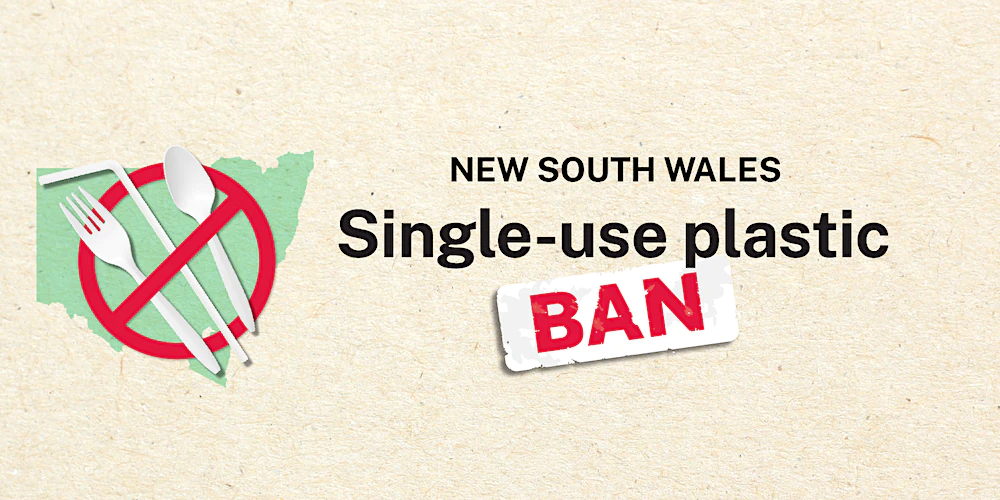Single-use plastics such as bags, straws, cutlery, plates, and cotton buds hit a dead end in NSW with a new environmental law banning their use as soon as next year
Over the coming years, several Australian states and territories are banning single-use plastic items as part of the government’s commitment to addressing the plastic waste problem.
At Paul’s Rubbish Removal Sydney, we’ve gathered everything you need to know about the recent plastic ban in NSW and how you can prepare and adapt to the environmental policy as a resident and a business owner.
NSW Banning Single-Use Plastics
The Government of New South Wales passed the Plastic Reduction and Circular Economy Act of 2021 on November 16, 2021. The motion to totally ban problematic plastics (single-use, etc.) is a step towards Australia’s vision to help curb the plastic waste problem.
Over 16,000 residents and businesses contributed to the legislation’s development and supported the NSW Plastics Action Plan. More than 98% supported a total phase-out of single-use plastics to support action against plastic waste.
The Plastic Reduction and Circular Economy Act provides a thorough and well-established guide to help the NSW government, its people, and its businesses transition towards a circular economy. That is where resources and used materials are kept valuable while creating more jobs and protecting the environment.
The NSW began banning lightweight single-use grocery bags on June 1, 2022. Moreover, the state will impose a complete ban on other plastic items effective November 1, 2022, such as:
- Polystyrene cups and foodware
- Personal care products with plastic microbeads containing phthalates and Bisphenol-A (BPA)
- Single-use plastic cutlery, plates, straws, bowls, cotton buds, etc.
The NSW Government established a comprehensive legislative framework to address problematic plastics by laying down design standards.
The first standard aimed to phase-out plastic microbeads as soon as November 1, 2022. Throughout this transition, businesses will get support to adapt and source other products before the ban is in full swing. Businesses and people who rely on single-use equipment for medical reasons will get an exemption.
Minister Matt Kean of the Treasurer and Energy and Environment department reported the NSW Government allocated $356 million for the next 5 years to mobilise the NSW Plastics Action Plan.
The NSW government expects this legislation to curb more than 2.7 billion problematic plastics from polluting the natural environment and water resources for over 20 years. An environmental movement at this scale is a game-changer for humanity’s ongoing fight against plastic waste and the climate crisis.
The NSW Plastics Action Plan bans problematic single-use plastics such as:
- Lightweight plastic bags
- Plastic straws
- Cotton buds with plastic sticks
- Single-use cutlery (forks, spoons, knives, sporks, stirrers, chopsticks, food picks, etc.)
- Expanded polystyrene food and beverage packaging
- Plastic plates & bowls without lids
- Consumer products containing phthalates, BPA, and other microbeads
Here is a complete and comprehensive list of single-use plastics banned across states and territories from Australian Marine Conservation, an independent environmental charity working on issues impacting marine wildlife.
How can I prepare for the plastic ban?
Businesses and households can prepare for the phasing out of problematic plastics by:
- Informing employees about the banned items and changes in business operation
- Use remaining stock plastics until the ban and purchase allowed and reusable materials moving forward.
- Assess your items’ stock-take and determine how long before you use up the banned items
- If you have massive stocks that won’t run out until the ban, ask your supplier to consider accepting returns or exchanges.
- Be creative. Develop a marketing campaign that describes your transition to appeal to customers that prefer environmentally-friendly materials.
What are common alternatives to single-use plastics?
Here are reusable and sustainable materials to help businesses and households transition from single-use plastics:
- Stainless steel or bamboo cutlery
- Accepting reusable cups and metal tumblers from customers for beverages and coffee
- Straws made from paper, bamboo, steel, or silicone
- Providing straws only upon request
- Using cotton buds with paper sticks. Bamboo sticks are another alternative, but they can damage your ear canal or eardrum if used frequently.
Upcoming NSW plastic bans
From the diagram above, you’ll find that the NSW government has yet to ban a few plastic items. Currently, the Australian industry and government are working together to ensure that sustainable alternatives are available as soon as more items are banned.
Furthermore, 3 years after the legislation, the government will review more problematic plastics and will determine whether a phase-out is necessary for items under review, such as:
- Plastic cups + lids
- Plastic bowls + lids
- Oxo-degradable plastics
- Fruit marking stickers
- Heavyweight plastic grocery bags
- Product bags
Learn more about Australia’s single-use plastic bans
Check out National Retail Association’s weekly webinar for more information and advice about plastic bans across Australia’s states and territories. The webinar airs every Friday at 10 am and tackles business concerns throughout November 2022.







